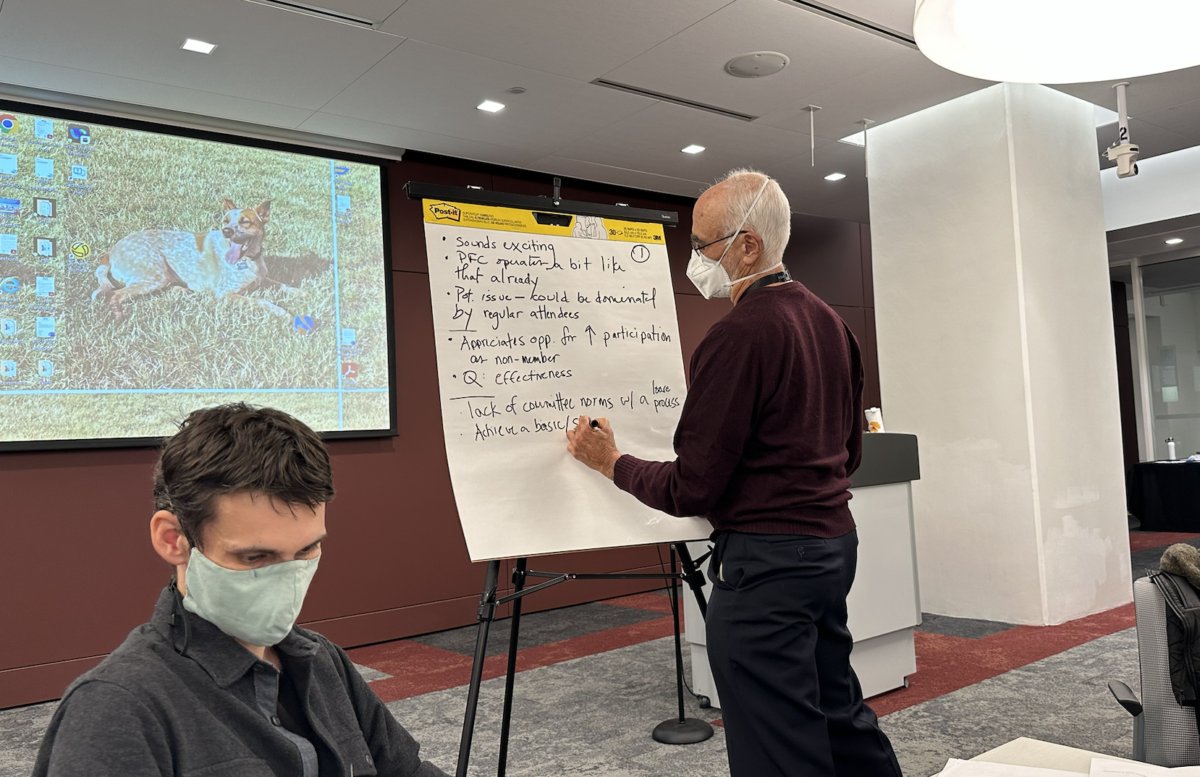
Portland’s modal advisory committees are due for a restructuring. Frustrations among members of the bicycle, pedestrian and freight advisory committees have been simmering for years and the Portland Bureau of Transportation is finally leading an effort to shake things up.
A workshop held at the Portland Building last night showed this process isn’t going to be a cakewalk for those who want to see change in the relationship between the City of Portland and these advisory groups. Though there appeared to be goodwill among committee members, they seemed frustrated by PBOT’s lack of clarity around how the bodies can be most effective.
After PBOT launched this reform effort back in May, project leaders spent the following months evaluating the committees to determine a framework for change. They looked at how other cities run their advisory groups and talked to committee alumni and city staff to get an idea of current conditions. Ultimately, they came up with a problem statement to ask when determining a new committee structure:
“How might we create modal engagement that is meaningful to the participants as well as to the City and PBOT staff, while representing a full range of perspectives?”
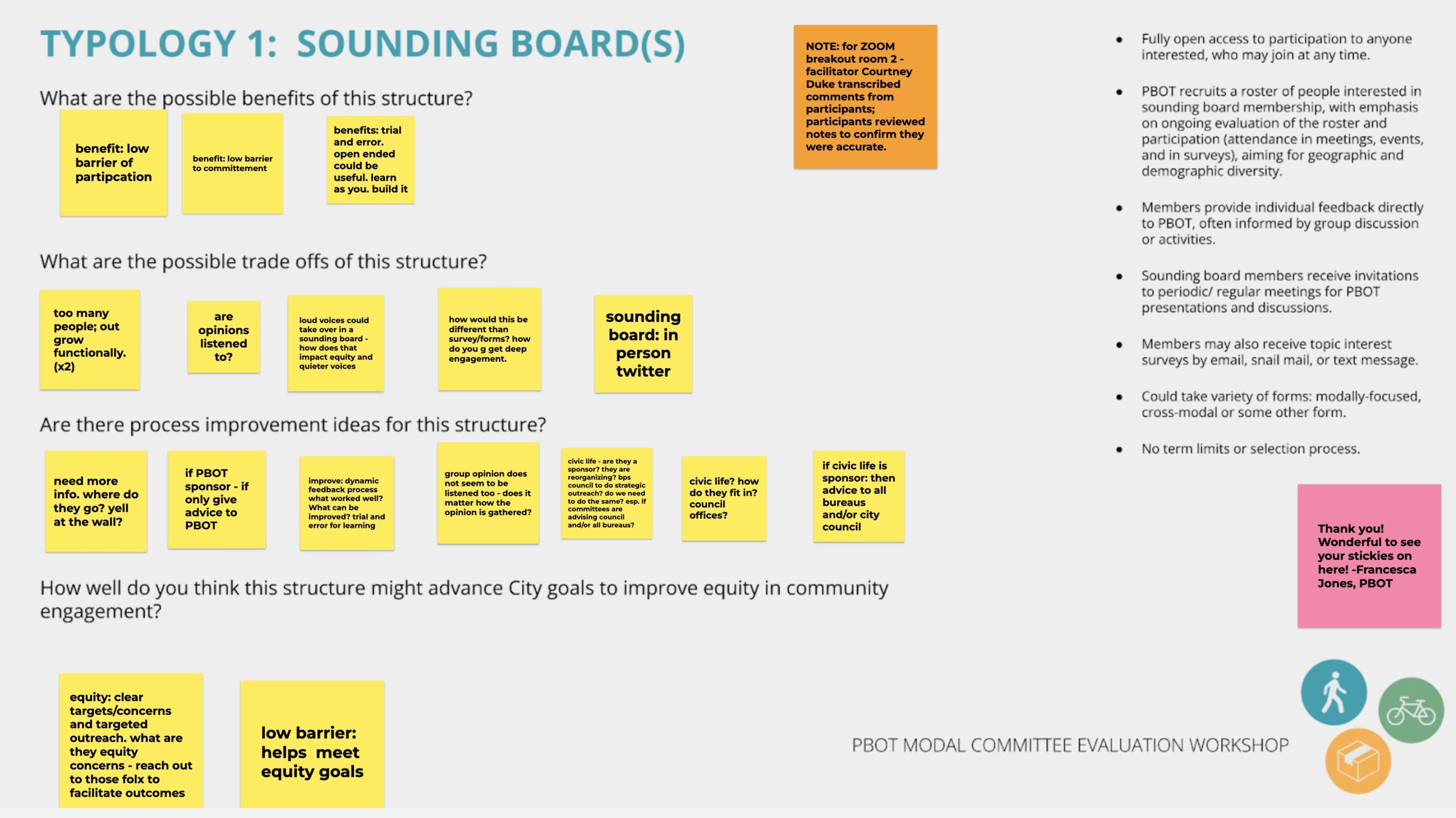
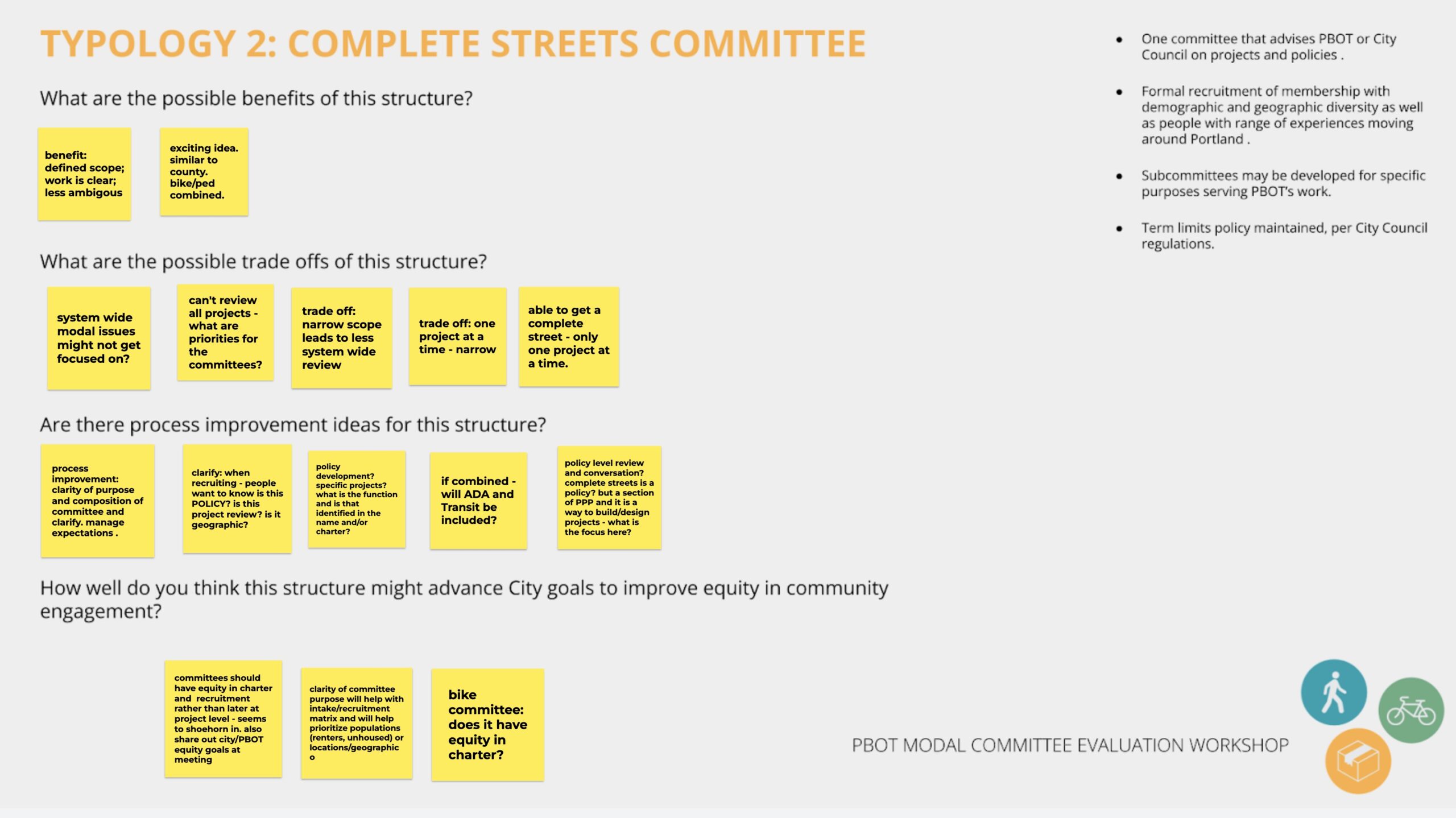

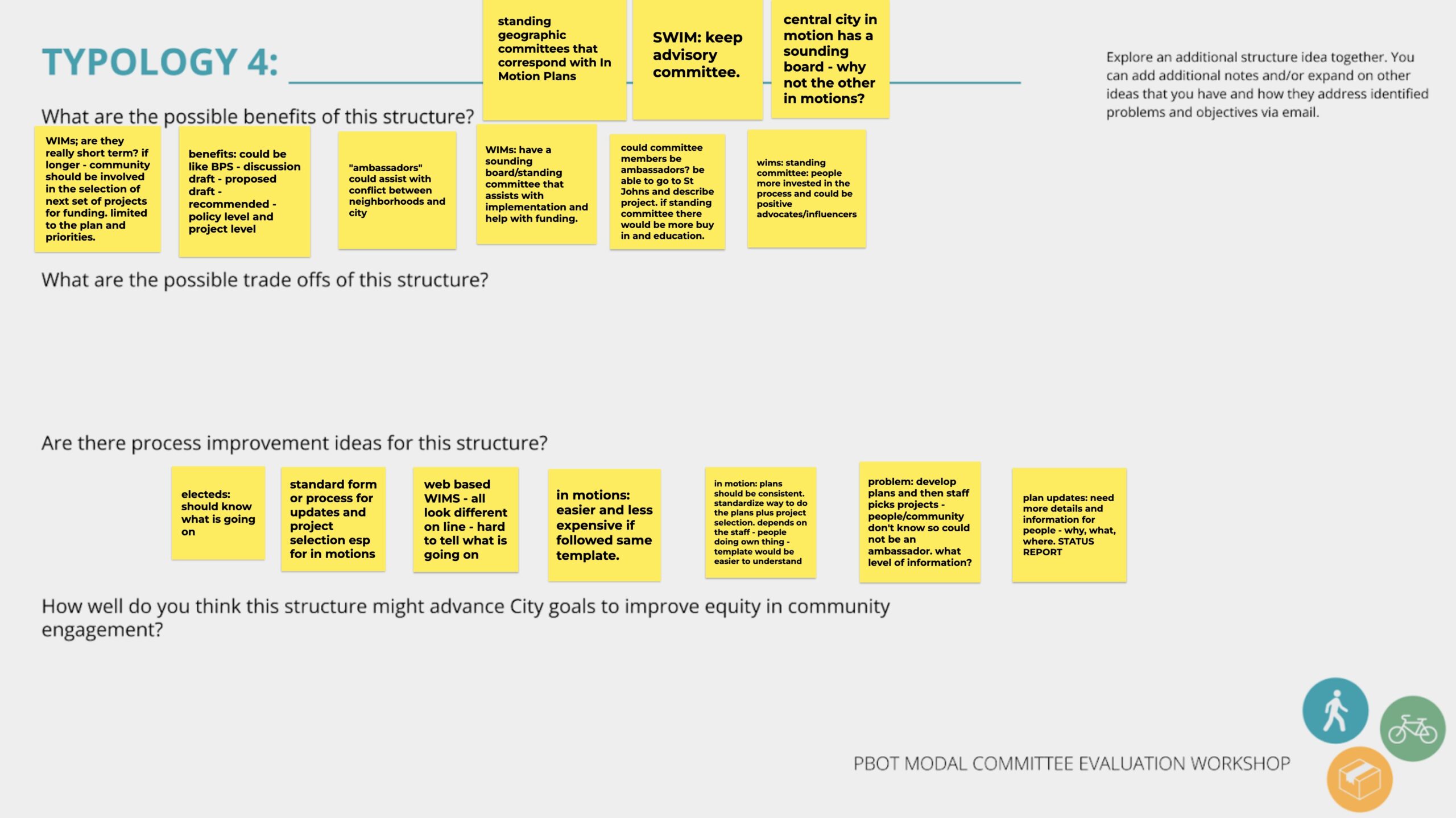
At the meeting last night, workshop participants discussed four potential alternatives to the current committee structure which could better reflect this problem statement. I’ve summarized them below:
- Sounding Board(s), which would be fully open to participation from anyone interested, who can come and go as they please, without any selection process or term limits.
- Complete Streets Committee, which would consist of one committee to advise City Council on projects and policies and involve a formal recruitment of membership with demographic and geographic diversity.
- Existing Structure +Plus, which would maintain the current modal committee setup while opening the door for changes according to public feedback.
- Something Totally New
The majority of time in last night’s workshop was spent split up into groups with participants discussing the pros and cons of each of these potential committee setups. This conversation quickly led to inquiries about what the point of the modal committees is in the first place, which PBOT staffers were hesitant to answer.
Josh Roll, a member of the Pedestrian Advisory Committee (PAC), tried to get at this question right off the bat.
“I’m still keep really curious to know what you guys need from these committees,” Roll said. “You’ve laid out the scenarios for different typologies, and that’s really helpful. But I’m still questioning what it is that would help you do business.”
When PBOT project manager Kristin Hull addressed this question, her answer was opaque.
“[The committees] are just another method of engagement along with all the investigations we do,” Hull said. “We do all our public engagement to ask people questions that we want the answer to so we can use the answer to influence decision-making.”
When pressed to elaborate, Hull resisted, unwilling to differentiate between the advisory groups and other mechanisms of public engagement, which some workshop participants found confusing.
“I’m still just very lost in thinking through the answer to my question,” Roll said. “[The committees] are more than public outreach, I think.”
This confusion gets at the key frustration driving the need for modal committee reform in the first place. If the committees aren’t providing PBOT with meaningful input that they actually use, what’s the point of having them at all?
Members of each of the advisory committees feel they don’t have enough of a say in city policy and are confused about what PBOT wants from them. Looking at the Bicycle Advisory Committee (BAC) in particular, it’s clear these frustrations have boiled over in recent years.
After several major instances where BAC members didn’t feel heard by PBOT – one moment in particular being when PBOT ignored its recommendation to put bike lanes on SE Hawthorne Blvd in early 2021 – many members resigned before their terms were over. The current BAC is composed almost entirely of new members who have only been on the committee for a little over six months.
But BAC members aren’t the only ones who think they have limited power. Members of the freight committee also have gripes about their influence weakening over time despite having an objective advantage over the other committees due to not having to abide by term-limit rules.
One of the biggest problems that committee members and PBOT staff alike want to solve is the lack of racial, socioeconomic and neighborhood diversity within the committees. This is one of the fundamental questions guiding the reform process and will play a large role in determining which structure will prevail going forward.
There appears to be some concern about whether it’s possible to create equitable and diverse committees while maintaining a sense of expertise among members. Participants seemed to agree that members of the modal committees should have some distinguishing knowledge about the subject matter in their field of interest so they can give informed advice to PBOT staff. But this knowledge doesn’t necessarily have to come from a professional career in transportation.
Joe Arraiga, a bike advocate who doesn’t serve on any of the committees, said he thinks experience should matter more than expertise. But membership shouldn’t just be chosen haphazardly.
“I feel like bicycle infrastructure is often designed by someone who doesn’t ride a bike, so they don’t understand what the needs are and why certain designs won’t work,” Arriaga said. “People in the various committees should have lots of lived experience with these different modes.”
While members of the bike and pedestrian committees are largely volunteer advocates who don’t represent any organization, the freight committee is made up of industry professionals who have an outsized influence on City Hall because of their financial power and political experience. At last night’s workshop, freight committee members acknowledged a need for diversity in their group, but said it was important to maintain expertise because freight is a niche subject that the general public doesn’t always know about.
“The turning radius of a [semi-truck] is something you really have to be aware of,” freight committee member Bill Burgel said, adding that he doesn’t think determining the technical points of bike or pedestrian infrastructure is as complicated.
This perspective is what has kept freight committee members in their seats for so long, much to the irritation of people in the other committees who have to adhere to the term limit requirements. Freight Advisory Committee members have been able to stay past their term limits because they asked for an exception to the rule in order to work on the 2040 Freight Plan, which they say would be disrupted if new members were allowed onboard.
Despite these disagreements, it was clear at last night’s meeting that members of the different advisory groups want the chance to interact with each other more and have meaningful discourse. Whichever modal committee structure ends up prevailing, it’s evident there’s a hunger for more dialogue between freight, bike and pedestrian representatives.
PBOT will use the information gleaned from this meeting to come up with another report that they will release later this fall. They’ll also be meeting with transportation justice groups to continue workshopping the best structure for modal committees. We’ll keep you posted on how things shake out.



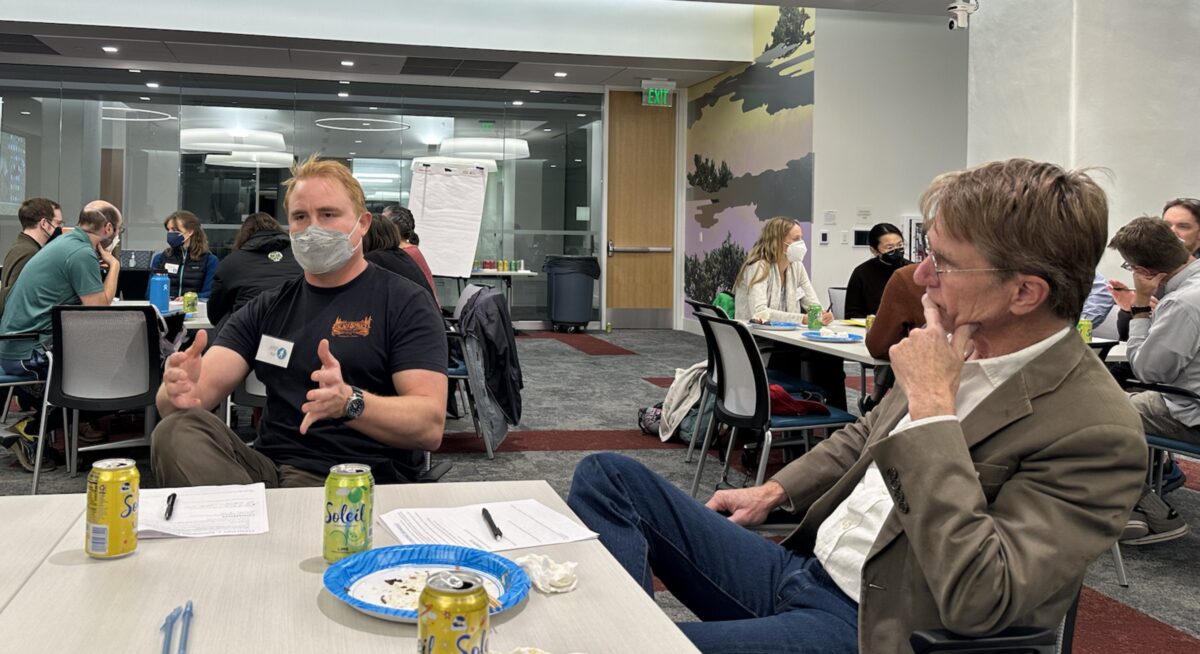
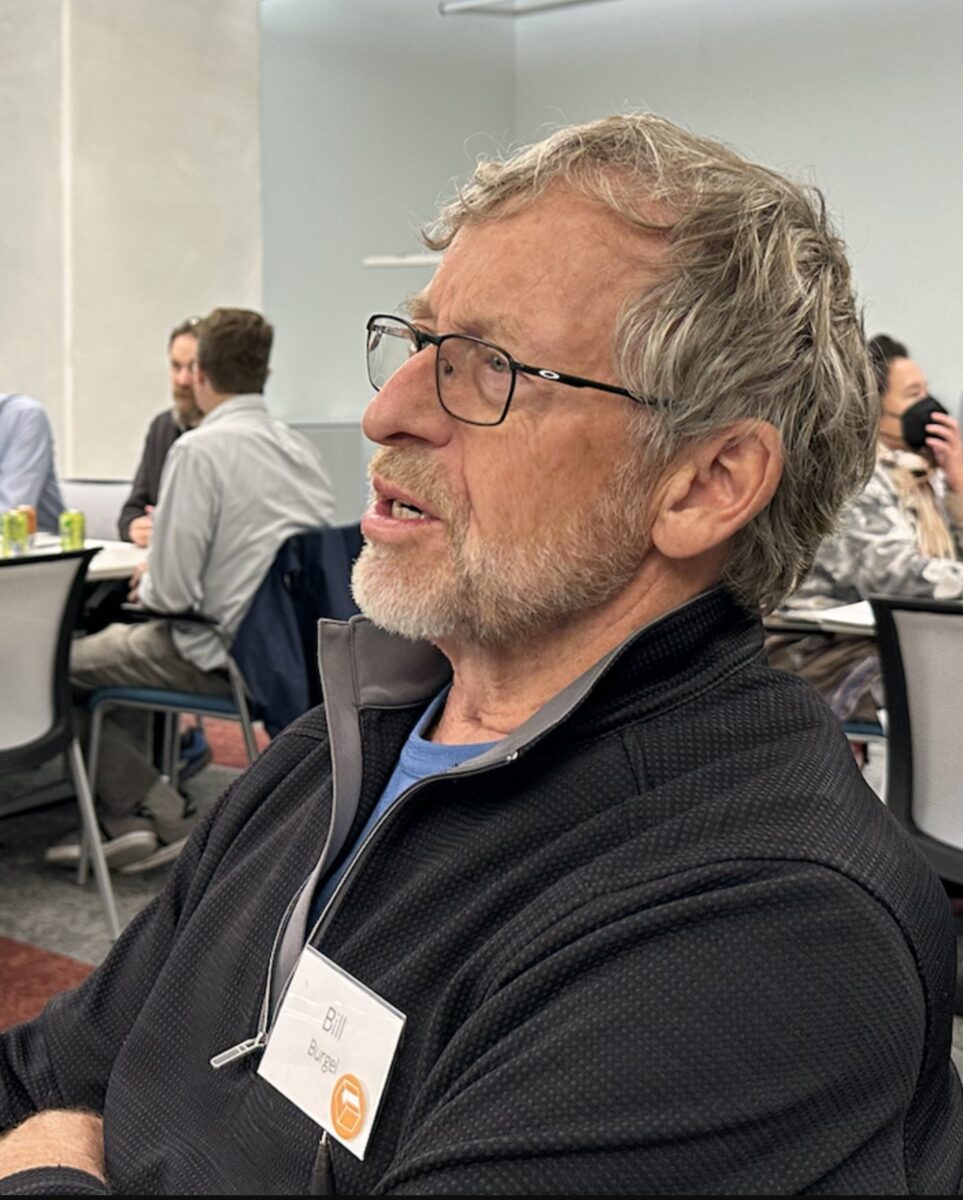
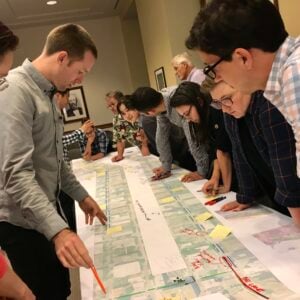
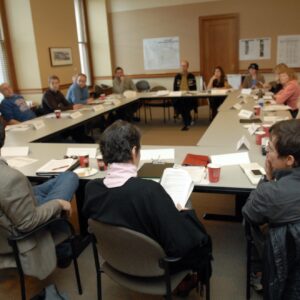
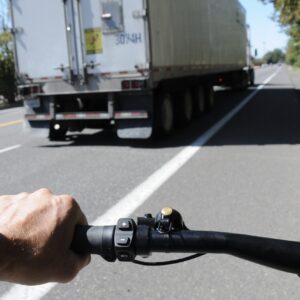
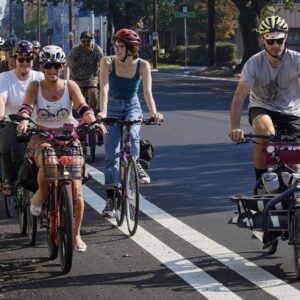
Thanks for reading.
BikePortland has served this community with independent community journalism since 2005. We rely on subscriptions from readers like you to survive. Your financial support is vital in keeping this valuable resource alive and well.
Please subscribe today to strengthen and expand our work.
Thanks, Taylor, for this great coverage of a meeting I was interested in but just couldn’t force myself to attend.
Kristin Hull’s answer was really telling: “You folks who give your time and have developed some expertise are just one more data point that we can choose to ignore if we want to.” At least she was honest, in an oblique way.
I’m now entirely cynical about all of these pubic-involvement efforts. Their fatal flaw is that they use all input the same way, whether it’s really stupid and flawed and superficial or thoughtful and insightful and well-researched. I once took the time to write a really thoughtful four-page “white paper” in response to a call for input about an issue. My paper was drowned out by “sticky dots” on a white board, put there by people who had thought about the issue for maybe two minutes.
That’s one reason I don’t participate in these efforts anymore. They allow agencies to claim that the public are deeply involved in decision-making, when in fact they are not. One ill-informed politician or bureaucrat or well-connected lobbyist can wipe away the hard work of an advisory committee in a New York second.
I attended the online version of last night’s meeting, with a dozen others, having served on the BAC in 2014-15 and the Bureau budget advisory committee 2009-15.
Your quote very well sums up the dilemma of these committees. If the committee isn’t effective and ends up being a waste of everyone’s time, as is the case with the present BAC and PAC, then not just lobbyists but even neighborhood types will seek alternatives for influence on projects and program funding, thus rendering the committee even more utterly irrelevant. But such lobbying is not equitable by any stretch, and on the long term this will be detrimental to good governance, so it is in the long-term interest of both the agencies and of the city’s citizens to come up with a better and more equitable process for lobbying by community members.
One thing that I think needs to be made clearer by staff at the outset is that these modal committees are designed to be city-sanctioned lobbying sessions by members serving on these committees, whether members are paid professional lobbyists or not. Yeah, sure, one can give advice, but the bureau is full of planners and engineers who are paid to do just that. But the main point is to influence the process and agency decision-makers.
I once wrote a very well written & researched 17 page ‘white paper’ indicting PBOT for their failure to include bike infrastructure on SE Hawthorne Blvd. in the Transportation Plan being developed for the Boulevard at the time and it was similarly ignored, as was fully half of the input at the public meeting the city held in the Echo Theater back in the late 90s. PBOT basically does what they want and uses ‘public input’ as a convenient relief valve for dissenting opinions, without ever addressing the issues the dissenters bring up. I have also given up on participation.
I’ve served on the Fix our Streets (Gas Tax) Oversight Committee since its inception. Over the years, I have also attended the BAC, Freight Advisory Committee and others. My experiences echoes what others have shared, but what is most notable to me is how much difference these committees have in terms of how they function and hold power. My sense is that PBOT has a very open-ended or nebulous framework for how/when committees make decisions and provide input. In this vacuum, individual committees or members can be quite varied in how much power they wield. Obviously, this heavily favors the folks who are most experienced and well-connected – particularly folks who have a full time job lobbying the city and have served on committees for decades.
I’ll share a story that I think illustrates this. Back in 2016, we had the inaugural meeting for FOS Oversight Committee. In it, we were almost immediately asked to approve a very consequential decision around the Heavy Vehicle Use Tax, which the committee also oversees (in theory, at least). The decision was framed as a yay or nay vote on a proposal that the FAC and others had already provided considerable input on. Without having any sense of how to make a decision or even what the issue was, the committee initially seemed hesitant to take a position. However, freight representatives, familiar with the issue and the advisory committee structure, quickly moved to influence the decision making process and force a vote. The vote passed narrowly with a large number of abstentions. Later in the committee’s life, seasoned advocates helped push back on such blatant rubber-stamping by pushing to formalize the committee’s role and responsibility in fulfilling PBOT’s commitment to voters. However, much of this power was lost when many of these members left the committee. Alas, we are all very busy and I suspect few of us have anyone paying us to sit in these meetings.
I’m trying to imagine what PBOT could do to make committees like the BAC or the FOS Oversight Committee as effective as the FAC. Honestly, it’s a very difficult to problem to make this situation completely equitable. A good to start would be for PBOT to be much more explicit about exactly how/when these committees fit into the decision making process. When do we get to decide, what is the decision making criteria, and what happens if we say No or fail to decide? We need to be informed, trained, and held accountable to a process that everyone (including the public) can understand. This is particularly important for new committees, those composed primarily of unpaid volunteers, and those that have historically struggled to be effective. The other thing that would help immensely is to pay people to sit on these committees, but I don’t see that happening any time soon. Maybe we could at least pay the chair person – our committee has often failed to appoint one.
City stall coo with empty, soothing sounds to activist citizens and give Freight whatever they want. Same as it ever was
I’m still inclined to think that this emphasis on public engagement above all else is, ultimately and most importantly for those who emphasize it, a great way to defer action. Think back to that (by now) infamous Streetsblog post from the consultant out of Boston going to Amsterdam and claiming Boston’s process was better because it “centered marginalized voices”…even though it’s much harder to get around Boston without a car than it is Amsterdam.
We already know what works for improving general mobility; all we need to do is look across the pond–at this point, either pond–to see it. Motorist voices’ need to be ignored, and those who claim that autocentric infrastructure and urban forms will work if we build them out enough are either ignorant or willfully lying.
Enough with the committees, the public outreach, the community surveys, the reform panels. Just stop building car-dependent suburban sprawl and stroads; stop widening highways. Build compact, walkable/bikeable/rollable towns and cities; nothing else will work without excluding the poor and the vulnerable, bankrupting us all, destroying the planet, and socially isolating us all.
I actually agree with the freight person, bike and pedestrian infrastructure is easy to design. There are all sorts of standards and guides that show exactly what to build.
PBOT has the unique, self imposed challenge of trying to design bike and ped infrastructure that doesn’t inconvenience motorists, slow them down, or make them change course. PBOT wont install evidence-based safety infrastructure on our “greenways”, much more real bike infrastructure on our streets. Instead of traffic diverters, we get beg barrels no one pays attention to because the last thing we’d want to do on our greenways is discourage motorists from using them.
So instead we get garbage like double-paint unprotected bike lanes, the weird bike crosswalks that don’t give users right-of-way, and the “pleasssseeee only go 15” signs.
The problem is that American planners have been brainwashed into believing that public feedback is important. Even great ones who would love to just copy the Dutch (there aren’t many).
Public engagement is a great way to defer to action if you’re using it as a way to defer action.
Comment of the Week.
Mostly-white and well-off bureau planners/managers have immense power in Portland but rarely receive any of the blame for Portland’s lethargic response to ongoing crises and long-term goals. Perhaps PBOT, BPS, PHB, and BDS also need restructuring to better represent Portland’s equity and sustainability goals.
How about we defund PBOT, BPS, PHB, and BDS, lay off all their employees, then outsource the needed services to the Amsterdam city government?
I hate this, Portland is not Amsterdam and it is a huge generalization to think we can just import their solutions; it won’t work and we need to come up with our own designs but so far what PBOT has come up with really isn’t cutting it.
Buddy, Portland wishes it could be Amsterdam, and adamantly refuses to do anything to be like it or other more equitable places. Because it’s so special. If all people always had this mindset about new ideas from other places, I swear, fire would’ve never spread, even as it burnt our huts to the ground
I am so sick of people saying that! It seems like they just use it an excuse not to do anything. Focusing on moving freight, instead of keeping people safe? Oh well, we’re not Amsterdam. Ignoring the way people actually move through the city? Oh well, we’re not Amsterdam.
Amsterdam was not always Amsterdam! They studied their city to find things that would help people, and actually implemented them. Until attitude like yours change, nothing will actually ever get done.
Portland may not be Amsterdam, but holding them up as example of good infrastructure might actually lead to some solutions. I just hope it’s not too late.
I know this is a pipe dream, but the city shouldn’t be hiring any employees it has to retrain to be sensitive to equity and sustainability goals.
And then PBOT will study the effects of the report on the community and issue another report on the outcome of the first report. Then, we will need a new twenty year plan on how we can increase the amount of reports and plans PBOT produces.
PBOT truly inspires with the amount of bureaucratic waste and performative nonsense they can achieve.
Yes! So many meetings, and things happen so damn slowly! Arrrgh, the frustration!
There seems to be a common misperception that just because an agency disagrees with what an advisory committee thinks, that means they are “ignoring” them. “Ignoring” would be not even asking the question and not taking your “advice” (that’s an advisory committee does, they advise) into consideration. It’s not “ignoring” to simply disagree with the advice. Advisory committees have a powerful voice, but they do not make decisions. That is up to our agency leadership and our elected officials. Saying that PBOT “ignored” the BAC by not putting bike lanes on Hawthorne is the same as saying PBOT “ignores” the Freight Committee every time they put bike lanes on a street over the Freight Committee’s objections, which happens quite often. “Ignoring” would only happen if PBOT never went to the committees to ask their opinion. But they do ask for the committees’ opinion–they just don’t always do whatever they say.
Okay, with that rant over, just want to say I really like the idea of a holistic Complete Streets Committee that would have to really wrestle with modal trade-offs.
The thing they are ignoring is international best practice (NACTO and CROW, basically), established design principles which the BAC is merely attempting to communicate to them.
I think some cycling enthusiasts don’t recognize the concept of modal trade-offs. It’s as it people walking/rolling and busing don’t exist in their theory of change.
I always appreciate that you are one of the only ones on the BikePortland comments who seems to actually champion people walking and taking transit.
It seems like more of a performative ask than anything else. It’s not like they actually reach out most of the time. The deed is already done
I’m pretty sure that they ask the public, and form the committees, so they that they can go back to their bosses say that they asked the public. Kind of like Trimet asks the public when they’re already halfway through the design phase.
I agree that Bill Burgel’s comment is BS: every engineer has Autoturn software and knows how to use it. Road standards have been developed around accomodating trucks for the last 80 years. Bikes, peds, scooters, wheelchair users, strollers, require a more nuanced and thoughtful understanding to successfully design right-of-way improvements that support them
As long as they have the strength to see it through to the end!
Thanks for covering this, Taylor.
Yeah, that’s about what I figured would happen.
Term limits for all committees. Especially the freight committee, you don’t even have to be a resident of Portland to sit on the PDX Freight Committee, who have more sway then ACTUAL RESIDENTS. They copy and paste their policy directions straight to the Joint Transport Committee in the legislature, bypassing all other Portland Committees. They are organizing joint testimony to provide input at the State level from a City committee. No other committee does this leap frog over City Council. That’s why we can’t get any changes in the OR Legislature, the PDX Freight Committee jumps the queue of due process ALL THE TIME.
I hate to suggest yet another committee, but we also need a transit advisory committee, or some equivalent. TriMet has a variety of committees, but none to specifically look at the functionality of transit service and facilities in a comprehensive, system-oriented rider-centric fashion.
A symptom of this problem is the inferior plans that were developed for transforming the Hollywood Transit Center, although it isn’t too late to improve that design, including the bicycle/pedestrian ramp to the I-84 over-crossing, and improving bus/rail transfers, which was the intended purpose when the Transit Center was built.